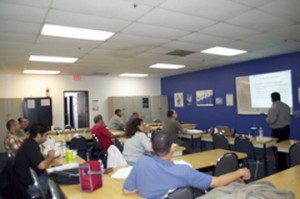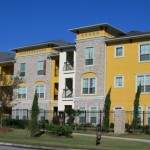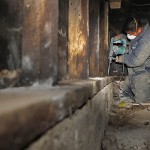SACRAMENTO – The Humboldt County District Attorney’s Office and the Contractors State License Board (CSLB) worked together in an undercover operation that ultimately exposed contractors for performing construction work without a license.
The severe stormy weather in early February precipitated the increase in demand for home repair work in southern California. As a result, unlicensed contractors began advertising themselves as available for hire for construction contracting services.
In California, it is required by law for unlicensed contractors to state clearly that they are not license holders and that they cannot bid on work contracts valued higher than $500 (including labor and materials).
But in Eureka, CA this month, law enforcement and the CSLB discovered that four unlicensed contractors had submitted bids ranging from $1,400 for a home painting project to $12,000 for deck work. Exceeding the legal limit of $500 is a blatant violation of the standards and regulations put in place by the CSLB.
This undercover sting operation left each of the four unlicensed contractors with a Notice to Appear in criminal court. Their primary offense was allegedly performing contracting activities without the required licenses.
One of the offenders may face an additional obstruction of justice charge. After the accused individual was caught by the sting operation, they took to social media to post information about the crackdown, most likely to warn other unlicensed contractors to help them dodge controversy.
Investigators report that this person was expressly told not to spread information about the undercover operation. Now they and the three other individuals who were suspended for unlawful construction activities are looking at fines and possible jail time.
In a statement to the press, David Fogt from the CSLB Registrar underscored the importance of hiring licensed contractors for home improvement projects. He pointed out how after a storm, unlicensed contractors are more likely to take advantage of the moment and approach people in need of home repair.
Fogt’s message concluded with him saying, “That’s why CSLB educates consumers on how to protect themselves by hiring a licensed contractor — it takes just a few minutes to find a licensed contractor in California.”
Most contractors know that the CSLB operates under the umbrella of the Department of Consumer Affairs. The board licenses and regulates about 285,000 contractors in California and it requires that all of them carry some form of insurance or another to comply with public safety standards and to meet established quality standards.
When unsuspecting clients wind up hiring unlicensed contractors like the four individuals who got caught so recently in Eureka, they are unknowingly taking on a great deal of risk. Because the work of an unlicensed contractor is performed without the CSLB’s endorsement or oversight.
Homeowners hiring unlicensed contractors to perform construction work that exceeds the $500 limit open themselves up to potential legal problems and safety issues. They could be taking on the legal liability for any damages incurred as a result of the unlicensed construction work.
Taking on costs associated with workers’ compensation, building code violations, having to redo shoddy construction work, and other similar costs is wholly unnecessary. The CSLB strongly encourages consumers to plan ahead and hire a licensed contractor to ensure safe, efficient, and high-quality work from contractors.








